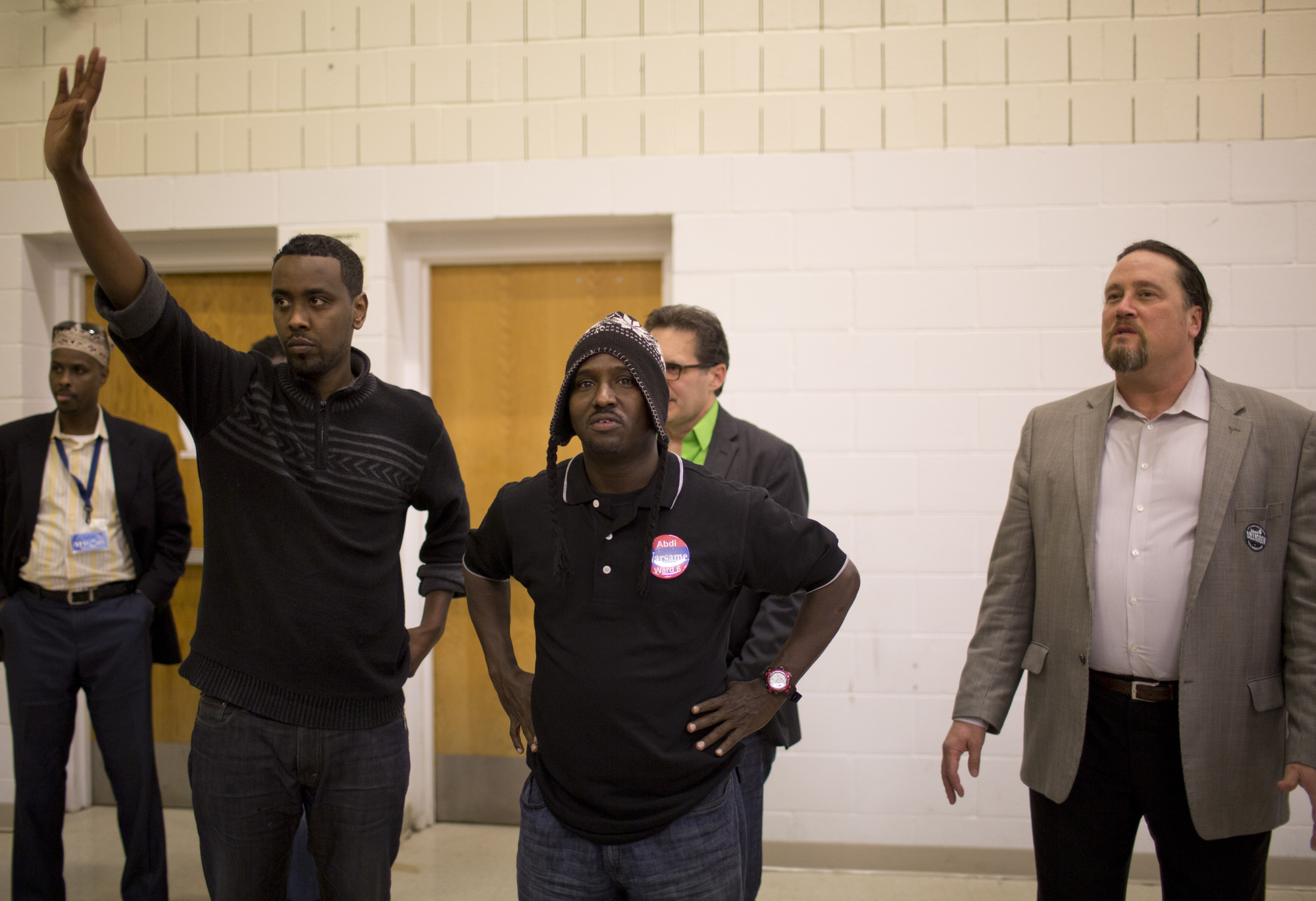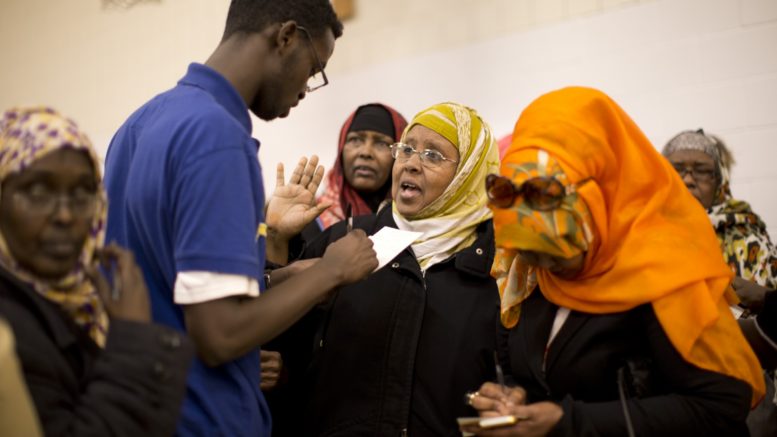Minneapolis saw a rise in caucus turn out on April 5, 2017. Thousands turned out to exercise their civic responsibility and the Somali community did not disappoint. Precinct caucuses saw an increase in the number of Somali Americans showing up to support their candidates early in voting process. Even in precincts that did not have a Somali candidate, residents showed their support and engaged their local leaders
Precinct caucuses are meetings organized by the state’s political parties to start the process of selecting candidates for the election that will be held later in November. Residents and candidates discuss policy positions and vote in a straw poll. Caucus turn out is also an indicator of which candidates will do well in the real elections and who the party will endorse.
In Minneapolis, all 13 city council seats are up for grabs. The mayoral race will also be held in November with multiple candidates and the current mayor running for reelection. It should be an eventful election year and everyone should come out and exercise their civic responsibility.
In comparison, Somalia did not have a functioning government for over two decades after ousting a brutal dictator who held on to power for 21 years. Over one million Somalis were displaced as refugees. Some were fortunate enough to relocate and start new lives in countries like England, US and Canada that have fully democratic governments. They were eager to exercise a lot of rights that they were either deprived from or that did not exist at all. Millions have fled to democratically run governments, raised children, flourished and some even became very wealthy. Many Somalis even ran successful political campaigns and got elected into public office. Voting is the most popular right among Somali Americans because the lack off is what many believe is what is wrong with Somalia. All that is an indication that the Somali diaspora is able to go back home and play a role in Somalia’s fragile government system that is considered one of the most corrupt in the world.
Somalia has not had peace in over a quarter century. That is due to several factors that include tribalism, corruption, foreign influence and more. Every time the country inches towards stability, a setback is almost always guaranteed. From internationally backed governments, to elected presidents, Somalia has seen its share of hindrances. Consequently the country is always facing famine, droughts, piracy, terrorism and more.
In most countries, civic responsibility is something that is thought in grade school. In a democratic country, the separation of powers, elections, taxes, federal authority and the justice system should be respected by all. Somali Americans experience democracy and a free market system every day. They appreciate it so much that a small neighborhood caucus can turn out over 800 people and 2 candidates. That is why the Somali diaspora living in democratic societies should be the catalyst for a democratic Somali government. Now that a dual American citizen is the elected president of Somalia, there is a lot of hope that he might bring around some change.
Somalia faced one of the worst brain drains in modern history. After the civil war broke out in 1990, the rich, the educated and the well-connected were able to flee with their families leaving behind the poor and the most vulnerable citizens. The poor and the vulnerable segregated each other by tribes and a never ending war ensued. Somalia became a breeding ground for all extreme ideas ranging from piracy to terrorism.
Meanwhile, the better off Somalis were able to raise their children in peaceful democratic countries while steering the pot that they left behind with tribal propaganda. Some even go back home to participate in rebuilding the Somali government but with bad intentions. It is very unfortunate but there is hope; the younger generation. It seems like the younger Somali generations are sick of the mess that they inherited. Millennials have been moving back to Somalia in droves with different agendas. Some work for the UN, some launch businesses, some vacation while others volunteer. It seems like the younger Somalis are less tribal based and more ambitious to see a better Somalia.
As discussed in last month’s issue of this newspaper, a drought is risking the lives of 6 million people but there is hope. Rain has been reported in parts of the country, relief from various agencies made it to the ground but there are still thousands who are in danger of malnourishment, disease and death. It will take time to recover from shortage of livestock and rain is still sporadic.
Going back to the caucus craziness in Minneapolis, ward 6 and 9 both saw very big turn outs. Ward 9’s caucus that includes the Philips, Powderhorn and Corcoran neighborhoods in Minneapolis saw over 800 people come out and fill up South high school’s cafeteria. Mohamed Farah, the founder of kajoog is running against Cano, who currently holds the position and Gary Schiff who used to hold the seat but left to run for mayor in 2013. Farah, a Somali American, won most of the delegates mainly due to the large Somali turn out.
Few blocks away in the ward 6 caucus, the scene was very chaotic. Fights broke out, an elderly person had a medical emergency and the fire department was called. The event was relocated from inside a gymnasium at Brian Coyle to a soccer field where the delegates were counted. Abdi Warsame, the current city council member is running against Mohamed Noor who runs a nonprofit in the Cedar Riverside neighborhood. Noor complained that some of the attendees did not live in the district while Warsame asked his supporters to keep it orderly.

Mumin Ali, a college student said, “it is my first time and I am here to support Abdi Warsame because I can see what he did and we know him”. Even though Abdi Warsame seemed to have an edge, the results of that caucus has not been finalized yet.
In conclusion, it is the responsibility of the Somali diaspora to import back the brain drain that have plagued Somalia for the last 27 years. It is the parent’s duty to teach their kids their civic responsibility. Good leaders come from good societies and democratic governments are run by good leaders who put the interest of the people first. The unity and civic responsibility exercised on the night of April 5th by thousands of Somali Americans to caucus in their respective neighborhoods in Minneapolis is the foundation of great country. As chaotic as the night got, it is the principles of voting that counts.
Major progress has been among Somali Americans in integrating within their local communities. That progress comes with experience and knowledge that can be shared with others even if they are across the Atlantic Ocean.

